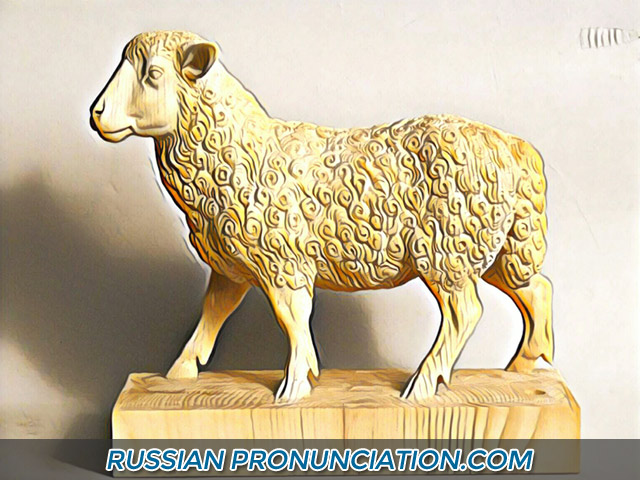
Full Episode Audio
Exercises Only Audio
Download Full Episode (right click save-as)
Alright, this is episode 6. Today we’re going to hone in on the most troublesome vowel for non-Russians. Listen and repeat: Ы
On paper, it looks like a lower-case English b, next to a capital I. But again, it’s a single letter in the Cyrillic alphabet. Listen again..Ы
Now there’s another Russian vowel that sounds very similar to it. Listen: И
Let’s listen to them side by side. The first…Ы and the other one И
So that first one, I find myself tightening my throat to make the sound. There’s almost this “uh” sound at the start of it. Whereas this one…И…really matches the E in American English.
For comparison, let’s put some consonants in front of those. We’ll start with a V sound…
Вы (…versus…) Ви
That first one, Вы, is how Russians say “you” when speaking formally to someone. It’s the ‘you’ that you’d use when talking to your boss, or really any adult you don’t know. Listen to them again side-by-side: Вы….Ви
You might be wondering…Man, the difference is so small. Does it really matter? And to be honest, it just depends. Depends on the words, on the phrase. Native speakers want to understand you, okay? They’re trying. But sometimes, one tiny vowel can change the whole meaning. Allow me to demonstrate that point by sharing a true story.
So, I was visiting a friend once, in Russia, in a city called Krasnodar. She was a language major at the university, okay? She spoke English great. Fluently. But remember…fluent is not the same thing as speaking without an accent. And though she and I mostly spoke in Russian, she wanted the chance to use her English with me, a native speaker, so I asked her to tell me about her grandparents.
People, this is a true story. So she says her grandmother was a painter, and her grandfather worked with wood. So this one time he carved a sheep. I’d seen other wood carvings around the city—I’d seen one of horses, and in the city center there was a big wood carving of some Cossack warrior—so I could believe he’d done one of a sheep. She had no photos of it, so I asked her to show me how big it was. She made a face, and then she said, “From here…” then she walked across the room, “…to here.”
I was like, Wow. That’s really big. What’d they do with it?
She made a face like it was obvious. “They used it to cross the river,” she said.
So I’m trying to envision this ginormous wooden sheep, like something out of Game of Thrones, like a Trojan Horse or something, and people are clinging to it as they float down the river.
“Yes,” she said. “And it had two big sails.”
That’s when my arm hairs stood up, and I realized: Holy God, this woman has been saying the word “ship.” The man built a wooden ship…not a sheep!
One tiny little vowel and the whole story takes on a totally different meaning. That’s why we’re focusing on the Russian vowel Ы today. When we’re speaking Russian, we don’t want to be telling any stories about giant wooden sheep.
On a side note: Most Russians, even ones with a lot of experience in English, living in country, they can not distinguish between “ih” and “ee.” Ship / sheep, fit / feet, and so on. That’s why all Russians make all their “ih” sounds into “ee.” Instead of saying: This is a big hit in my country. It comes out, Zees eez a beeg heet een my KAN-tree.
They simply don’t hear it.
Speaking a foreign language with an accent is the norm. It’s absolutely fine. We just need to make sure that we’re understood. So let’s get back to that troublesome letter Ы.
Repeat the following after the speaker: Ты….Ти
That first one, Ты, is the word Russian word for “you” when speaking to a friend or family member. Try it again?
Next: Мы…Ми
Let’s also add a letter after the vowel. Compare these: Быть…..Бить
The meanings of those two verbs are wildly different. The first means “to be.” The second means, “to beat someone, or something.” Let’s try the past tense of those. Again, the only difference is the vowel. Listen… Был…vs…Бил
One trick I found immensely helpful was to puff your cheeks when you say that first one. Like when you’re cold. Brrr. For a moment, your lips close fully and your cheeks puff out. Brr.
Был. They feel very similar.
Let’s make that our official phrase of the day. The speaker will say: I was in the bank. Listen and repeat. Я был в банке.
A woman would say it with an “ah” sound at the end of the verb. So she’ll say была. Listen…
Я была в банке.
How would a guy say: I was in McDonalds.
Я был в Макдоналдсе.
And a woman would say it:
Я была в Макдоналдсе.
I was in the theater.
(man) Я был в театре.
(woman) Я была в театре.
How would you say: The boy was in the park.
Мальчик был в парке.
How about: The toy was in the bank.
Игрушка была в банке.
Notice how the speaker used the feminine version, была, because ‘игрушка’ is feminine. This whole business of word gender, it’s beyond the scope of this pronunciation course, but we deal with in great detail in my Russian Made Easy podcast, and also in my new podcast called Understanding Spoken Russian. There you’ll really learn to pick out the gender of nouns and verbs just by ear, which is a great skill. Again, that podcast is called Understanding Spoken Russian. It’s in all the usual places: iTunes, Google Play.
Let’s continue our review. What should you say to someone first thing in the morning?
доброе утро
And to someone when you see them in the afternoon?
добрый день
Next, ask someone on the street: Where is located the theater?
Где находится театр?
How would a woman say: My name is Olga.
Меня зовут Ольга.
Did you catch that soft-sign after the letter ‘L’? Not ‘Olga’ but Ольга. Gotta bring that tongue up.
Anyway, tell her: Very pleasant…as in, It’s very pleasant to meet you.
Очень приятно
You need to leave but you’ll see her later, so what do you tell her?
До встречи
And finally, if you go to Washington D.C., the White House, the Capital building, the Lincoln memorial, the Washington Monument…these are some of the…what’s the word?
достопримечательности
Alright, let’s do some more work with Ы and И. Listen and repeat: Лы….Ли
Next the letter ‘P’ (П) : Пы…Пи
Let’s try some listening practice with these. You can echo the speaker if you’d like, but really I just want to see if you can spot the difference. So in each of the following words, say “the first one” if you hear that troublesome Ы vowel…and say “the second one” if you hear the И vowel. Ready?
дырка….1st one
мир….2nd one
быть … 1st one
вилка….2nd one
Вниз…2nd one
Мы….1st one
Ви….2nd one
Вы….there it is, the first one. Remember, Вы is the formal version of “you” in Russian.
How’d you do on that? If you get the chance, I’d love to hear from you, so feel free to send me an email at: mark (at) russianmadeeasy ((dot)) com
Podcast: Play in new window | Download

